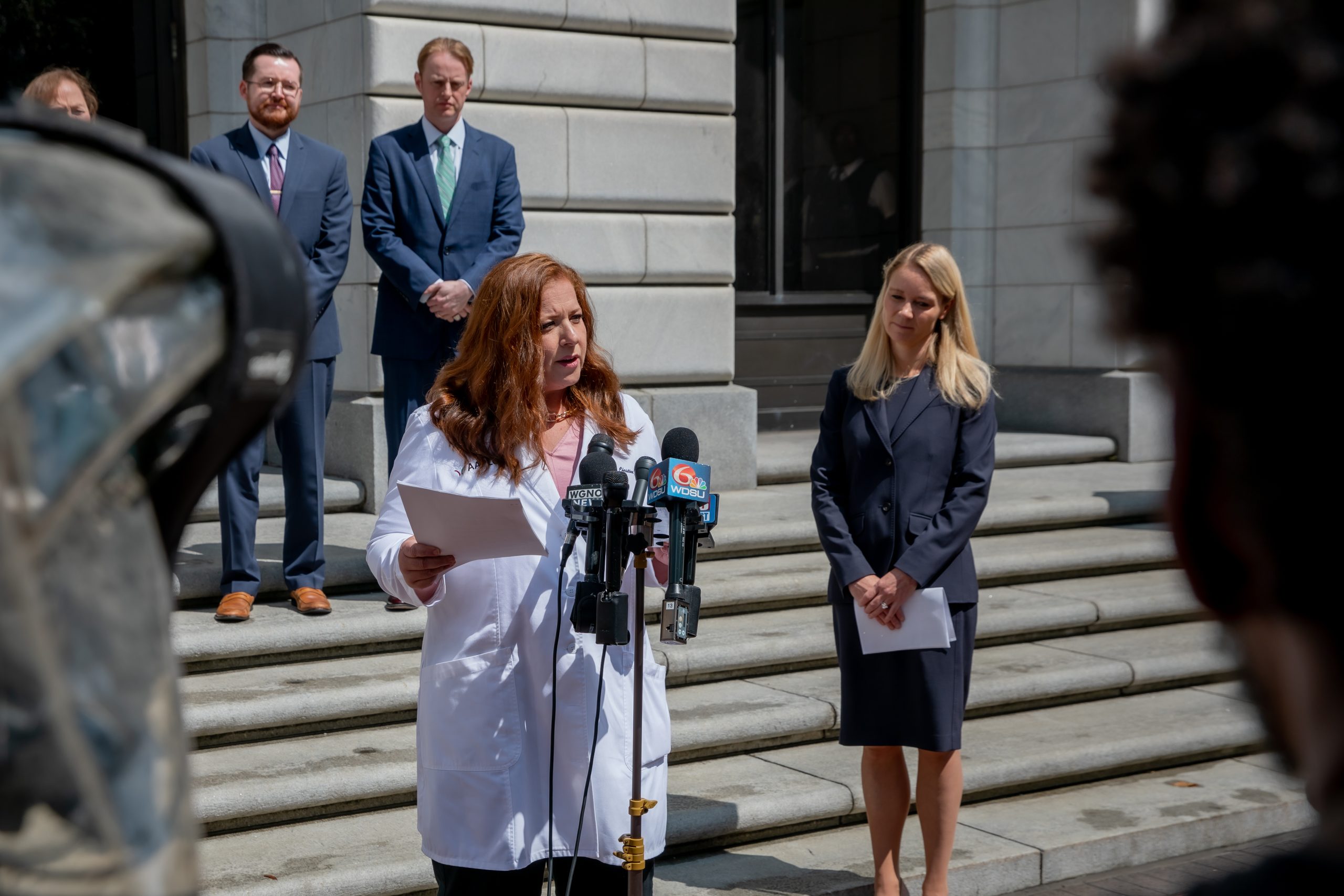The Food and Drug Administration (FDA) is asking the U.S. Supreme Court to review a lower court ruling in the Alliance for Hippocratic Medicine (AHM) v. FDA lawsuit, which would roll back expanded use of the abortion pill while a challenge to FDA’s approval of the pill is being heard. In August, the Fifth Circuit ruling returned FDA safety requirements on the abortion pill to those which existed prior to 2016, while the case was litigated.
Danco, the abortion pill’s manufacturer (which profits off the sales of abortion pills and appears to have failed to enforce safety requirements put in place by the FDA), has also filed a brief before the high court.
The abortion pill mifepristone was approved by the FDA in 2000, to be prescribed in-person through the 7th week of pregnancy. In 2016, the FDA removed requirements that all adverse non-fatal events be reported, allowed the pill to be prescribed through the 10th week of pregnancy, removed the requirement that only physicians prescribe the drug, and no longer required women to take the first pill at the facility.
In 2021, the FDA eliminate the in-person dispensing requirement and enabled the abortion pill to be permanently shipped by mail. Then in 2023, FDA expanded access further to allow retail pharmacies to dispense the drug.

FDA and Danco file briefs to SCOTUS in abortion pill lawsuit
Background
The lawsuit was initiated In November of 2022 by the Alliance for Hippocratic Medicine (AHM), a group of medical doctors and organizations who claimed the 2000 approval of the drug was illegal and the expanded use of the abortion pill was unsafe. The doctors testified to treating women with severe complications — “many who presented to the emergency room.”
On April 7, 2023, U.S. District Court Judge Matthew J. Kacsmaryk ruled in favor of the Plaintiffs to immediately suspend the 2000 approval and subsequent FDA changes to the abortion pill. But the case was appealed to the U.S. Court of Appeals for the Fifth Circuit, which issued a partial stay.
“After the 5th Circuit put only part of Kacsmaryk’s order on hold, the Biden administration and Danco went to the Supreme Court, asking the justices to freeze the entire order to maintain the status quo until the dispute is resolved. The justices agreed to do so in a brief unsigned order on April 21, with two justices – Justices Clarence Thomas and Samuel Alito – indicating that they would have denied the request,” ScotusBlog.com wrote. That order from the U.S. Supreme Court allowed mifepristone to remain on the market while legal proceedings continued.
AHM’s case went back to the Fifth Circuit which heard oral arguments in May. A 62-page decision issued August 16, 2023, by the Appeals Court ruled to allow mifepristone to remain “available to the public under the conditions for use that existed” prior to 2016. The decision would therefore remove mail order and pharmacy dispensing of the drug while leaving in place the FDA’s 2000 approval as well as its 2019 approval of the generic version (GenBioPro). The pill remains available under that April order from the U.S. Supreme Court and will stay in effect until the high court rules again on the matter or refuses to hear the case on appeal.
If the justices take up the case, oral arguments could come as early as next year and a decision could be reached by late June – in the middle of the 2024 presidential election, Scotusblog.com reported.

Dr. Christina Francis and ADF Senior Counsel Erin Hawley speak at a press conference (Image ADF)
FDA and Danco Petition SCOTUS
In their brief, the FDA argued that “loss of access to mifepristone would be damaging for women and healthcare providers around the Nation” and that “respondents’ asserted injuries cannot remotely justify the disruptive alteration of the status quo…”
Danco’s brief alleged the Appeal Court’s ruling was “flawed, and equally in conflict” with previous Supreme Court decisions. “This case presents a serious question: whether courts can disregard constitutional and statutory limits on judicial review of executive action in order to overrule an agency decision they dislike,” Danco’s brief claimed.
Danco claimed their case was of “indisputable importance” because “women and teenage girls, health care providers, and States” allegedly “depend on FDA’s actions to ensure safe and effective reproductive health care is available” and suggesting the Fifth Circuit’s ruling “will create tremendous negative effects, including pushing women to later gestational age surgical abortions or unapproved regimens with more complications, and impeding access to miscarriage management.”
Issue of Standing
“The district court… rejected the government’s arguments that respondents lack standing, and that their challenge to the 2000 approval of mifepristone was untimely,” the FDA acknowledged in its brief.
“The Fifth Circuit first held that respondents have Article III standing to challenge FDA’s decisions with respect to branded mifepristone… The court accepted respondents’ contention that treating women who take mifepristone and experience complications constitutes a cognizable injury because doctors who treat such patients may provide care that violates their consciences, may be ‘forced to divert time and resources away from their regular patients,’ and may be ‘expose[d] * * * to greater liability and increased insurance costs,’” the court document explained.
But the FDA went on to argue that “the Fifth Circuit erred in holding that the respondent associations have standing.”
“Respondents oppose abortion and therefore oppose the use of mifepristone. But respondents ‘are not required to receive’ or prescribe mifepristone, and ‘[t]hey do not have standing to challenge FDA’s decision to allow other people to receive’ or prescribe the drug because that decision does not impose any concrete, particularized, or imminent harm on them,” the Government claimed.
FDA’s Actions Arbitrary and Capricious
“On the merits, the court held that FDA’s actions were arbitrary and capricious under the Administrative Procedure Act. The court separately held that statutory provisions derived from the 1873 Comstock Act barred FDA from removing the in-person dispensing requirement,” the FDA noted.
The FDA then argued that “FDA’s actions were supported by an exhaustive review of a record including dozens of scientific studies and decades of safe use of mifepristone by millions of women in the United States and around the world. The Fifth Circuit swept aside the agency’s expert judgments based on novel requirements that have no basis in the FDCA or the Administrative Procedure Act.”
But the FDA failed to mention that many authors and organizations behind these “studies” had direct ties to abortion pill manufacturers Danco and GenBioPro, or to the investors that funded them.
The FDA described any claim of harm by the pro-life doctors as a “speculative chain of possibilities,” also noting that “the Fifth Circuit held that respondents are likely to succeed on their claims that FDA’s 2016 and 2021 actions were arbitrary and capricious,” according to the court document.
Complication Issues
“The Fifth Circuit relied on respondents’ allegation that some of their members have treated complications from mifepristone in the past,” the FDA argued, adding that “respondents alleged only a handful of incidents.”
“And in the rare cases where the result of those independent actions is a serious adverse event requiring medical treatment, FDA’s actions neither require patients to seek treatment from respondents’ members nor require respondents’ members to provide it,” FDA claimed.
But, again, the FDA’s brief failed to point out that the abortion industry (many who are approved by Danco to dispense the drug), openly defy the FDA’s REMS safety regulations by not providing assistance to women with abortion pill complications and instead telling abortion clients to simply present to emergency rooms and lie when experiencing abortion pill complications.
2016 Adverse Events Reporting
In 2016, FDA removed requirements that all adverse events be reported, so there is no way to even know how many complications there have been. This point drew the attention of Judge James Ho at the Fifth Circuit when he asked why the FDA would remove the non-fatal adverse events reporting “right when you were expanding its use.”
“Why deprive the world of that information?” he asked.
“The court further held that FDA acted arbitrarily in changing the adverse-event reporting requirement in 2016…The court stated that, although FDA had determined that the risks associated with mifepristone were ‘well known’ by 2016, FDA had ‘failed to account for’ the possibility that the 2016 changes ‘might alter the risk profile,’” the FDA noted about the Appeals Court’s ruling.
“In any event, even if the Fifth Circuit were correct that FDA acted arbitrarily and capriciously in eliminating the special adverse-event reporting requirement that previously applied to mifepristone, the only relief that such an error could justify would be an order requiring FDA to reinstate that requirement or explain more fully why it is unnecessary. The asserted error would provide no basis for suspending the changes to mifepristone’s approved conditions of use,” the FDA alleged.
The Record
The FDA claimed, “The court of appeals pointed to no studies or other reliable evidence suggesting that FDA’s 2016 and 2021 actions have had a substantial effect on the likelihood of adverse events that would require women to seek emergency care from respondents or their members. In fact, the record demonstrates that serious adverse events remain extremely infrequent with the relevant actions in place,” FDA claimed.
But the full “record” has not even been submitted to the Court — something Court of Appeals Judge Jennifer Walker alluded to in her questioning of the FDA’s legal representative during oral arguments at the Appeals level. The missing documents could likely include correspondence, expert reviews, studies, trials, or data surrounding the often secretive abortion pill approval process.
“Bits of the record were presented to the courts… but the full record remains unproduced,” Danco acknowledged in its brief. “Instead, the courts… rushed to award preliminary injunctive relief… lacking an administrative record,” Danco argued.
Consequences of Fifth Circuit Decision
“The Fifth Circuit’s decision also has serious consequences for Danco. Mifeprex is Danco’s only product. And the decision…will remove Mifeprex from the market entirely for an extended period of time,” Danco claimed. “FDA is currently enjoined in 17 States and the District of Columbia from taking any action that would change the terms of Mifeprex’s availability under the 2023 REMS,” Danco pointed out.
The FDA also argued that the Fifth Circuit’s ruling would have “disruptive implications,” suggesting the lower courts’ approach would “result in a seismic shift in the clinical development and drug approval processes, erecting unnecessary and unscientific barriers to the approval of lifesaving medicines, chilling drug development and investment, threatening patient access, and destabilizing the rigorous, well-established, and long-standing drug approval process.”
The only problem with that argument is that abortion pills are not “lifesaving” because pregnancy is not an illness and these pills kill preborn babies and sometimes harm pregnant mothers.








